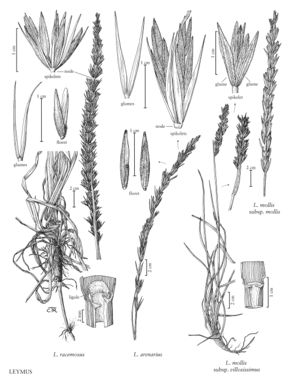Difference between revisions of "Leymus mollis subsp. mollis"
imported>Volume Importer |
imported>Volume Importer |
||
| (One intermediate revision by the same user not shown) | |||
| Line 37: | Line 37: | ||
|publication year= | |publication year= | ||
|special status= | |special status= | ||
| − | |source xml=https:// | + | |source xml=https://bitbucket.org/aafc-mbb/fna-data-curation/src/200273ad09963decb8fc72550212de541d86569d/coarse_grained_fna_xml/V24/V24_509.xml |
|subfamily=Poaceae subfam. Pooideae | |subfamily=Poaceae subfam. Pooideae | ||
|tribe=Poaceae tribe Triticeae | |tribe=Poaceae tribe Triticeae | ||
Latest revision as of 16:24, 11 May 2021
Rhizomes 4-6 mm thick. Culms (50)70-170 cm. Basal blades 22-94 cm long, 5-15 mm wide. Spikes 12-34 cm, with 12-33 nodes. Glumes 13-34 mm long, 3-4 mm wide, often longer than the lemmas, usually pilose, sometimes almost glabrous. 2n = 28.
Discussion
In the Flora region, Leymus mollis subsp. mollis grows primarily on the west coast; on the east coast, it grows in New Brunswick and Nova Scotia, particularly along the St. Lawrence River, and on the coast of Greenland. It does not grow along the arctic coast. Outside the Flora region, it is native in the coastal region of eastern Asia, growing primarily along the coast and in the mouths of larger rivers, and on the shores of large lakes near the coast from the Korean Peninsula to the Kamchatka Peninsula. It was introduced to Iceland, but is now rare there.
Leymus xvancouverensis is thought to be a hybrid between L. mollis subsp. mollis and L. triticoides, although its range extends beyond the current range of L. triticoides.
Selected References
None.
